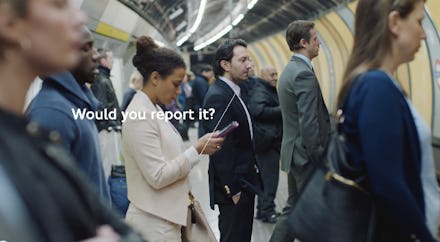This Campaign Is Encouraging Women to "Report It to Stop It"

Countless women have experienced public sexual harassment, but many of these situations go unreported. One bold new video campaign produced by Transport for London aims to let women know they should refuse this treatment once and for all.
This uncertainty surrounding the decision to report is at the heart of the organization's new campaign, which follows one woman's experience with harassment on public transportation — and her evaluation of whether or not she should report it.
"The man in the gray suit is staring at you," the narrator says at the video's outset. "Would you report it?"
"It's him again. You can feel his breath. Would you report it?"
"Is that his bag? He's not carrying one. One second, two seconds. Would you report it?"
"He finds an excuse to lean into you. Would you report it?"
"He pushes his groin right into you."
"Ninety percent of unwanted sexual behavior on public transport goes unreported," the narrator concludes. "You can report anything that makes you feel uncomfortable. Report it to stop it."
The video likely resonates with London women. One 2014 poll found a third of women in London say they have been verbally harassed on public transport and 19% have been victims of direct physical abuse, according to the Independent. Yet nine out of 10 of those cases went unreported, according to Transport for London.
This type of public harassment is not just a problem in London, though. For years, a culture of silence has upheld harassment as normalized and even falsely blamed women themselves for these experiences. One 2015 survey conducted by the organization Hollaback! and Cornell University even found that most women experience this before they're legal adults: Eighty-five percent of U.S. women experience street harassment before the age of 17, and 67% of women report experiencing it before age 14.
Given the clear pervasiveness of this serious issue, and the enduring cultural norms that pressure women to doubt themselves and remain silent about the experience, it's encouraging to see campaigns like this one offer support for women to action. More cities should take note of London's commendable effort and encourage their female residents to speak out as well.